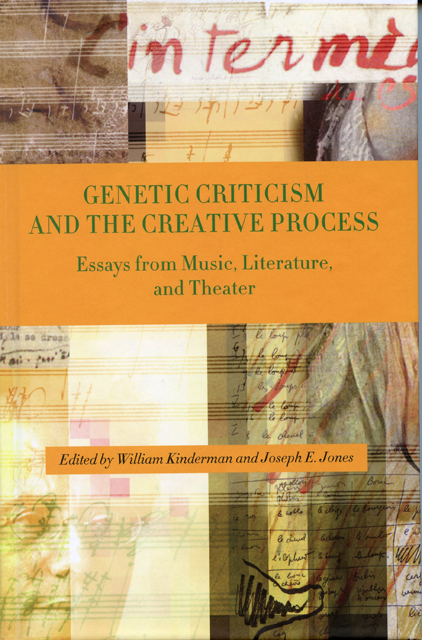Book contents
- Frontmatter
- Contents
- Acknowledgments
- Genetic Criticism and the Creative Process
- 1 Texts, Variants, and Variations: Evolving Contexts in Literature and Theater
- 2 Genetic Processes in Music: From Beethoven to Leroux
- 1 From Varieties of Genetic Experience to Radical Philology
- 2 Variant and Variation: Toward a Freudo-bathmologico-Bakhtino-Goodmanian Genetic Model?
- 3 The Genetic Record of a Voice: Variants in Barthes's Le Plaisir du texte
- 4 Can Genetic Criticism Be Applied to the Performing Arts?
- 5 “The hardy Laurel”: Beckett and Early Film Comedy
- 6 From Melodic Patterns to Themes: The Sketches for the Original Version of Beethoven's “Waldstein” Sonata, Op. 53
- 7 From Conceptual Image to Realization: Some Thoughts on Beethoven's Sketches
- 8 The Process within the Product: Exploratory Transitional Passages in Beethoven's Late Quartet Sketches
- 9 “They Only Give Rise to Misunderstandings”: Mahler's Sketches in Context
- 10 A Study of Richard Strauss's Creative Process: Der Rosenkavalier's “Presentation Scene” and “Schlußduett”
- 11 Genetic Criticism and Cognitive Anthropology: A Reconstruction of Philippe Leroux's Compositional Process for Voi(rex)
- Afterword
- Contributors
- Index
Afterword
Published online by Cambridge University Press: 02 March 2023
- Frontmatter
- Contents
- Acknowledgments
- Genetic Criticism and the Creative Process
- 1 Texts, Variants, and Variations: Evolving Contexts in Literature and Theater
- 2 Genetic Processes in Music: From Beethoven to Leroux
- 1 From Varieties of Genetic Experience to Radical Philology
- 2 Variant and Variation: Toward a Freudo-bathmologico-Bakhtino-Goodmanian Genetic Model?
- 3 The Genetic Record of a Voice: Variants in Barthes's Le Plaisir du texte
- 4 Can Genetic Criticism Be Applied to the Performing Arts?
- 5 “The hardy Laurel”: Beckett and Early Film Comedy
- 6 From Melodic Patterns to Themes: The Sketches for the Original Version of Beethoven's “Waldstein” Sonata, Op. 53
- 7 From Conceptual Image to Realization: Some Thoughts on Beethoven's Sketches
- 8 The Process within the Product: Exploratory Transitional Passages in Beethoven's Late Quartet Sketches
- 9 “They Only Give Rise to Misunderstandings”: Mahler's Sketches in Context
- 10 A Study of Richard Strauss's Creative Process: Der Rosenkavalier's “Presentation Scene” and “Schlußduett”
- 11 Genetic Criticism and Cognitive Anthropology: A Reconstruction of Philippe Leroux's Compositional Process for Voi(rex)
- Afterword
- Contributors
- Index
Summary
I had the great pleasure of participating in the conference, organized under the direction of the indefatigable William Kinderman, that led to the present book. That my own essay on Verdi's La forza del destino does not appear is simply a matter of timing: although I offered some preliminary thoughts about Forza at the conference, I still have not completed my investigation of the wonderful manuscripts pertaining to the opera that have been part of the collection of the Mariinsky Theater since 1862, when Verdi directed there the world premiere of the first version of his opera.
Though, of course, as genetic criticism has taught us, it is treacherous to speak of a “first version” or a “second version,” and so on, no matter how convenient such categories may be for those who make and use critical editions. And nowhere is this lesson more profoundly to be learned in the study of Italian opera than with La forza del destino. From the first moment that Verdi began to think seriously about his opera during the Summer of 1861 until he completed a final revision (how falsely “definitive” this formulation sounds) for Milan in 1869, he never seems to have left the work alone. Yet if we wish to know this score it is insufficient to look at the officially sanctioned texts. If we did not follow every aspect of its genesis, how could we fully appreciate from whence the problems in the dramaturgy of Act III derive and how we might try to solve them in performance? We would never know that the prayer in the Scena dell’Osteria was written without the winds sustaining the voices and that Verdi apparently added those sustaining wind parts to keep insufficiently able singers in tune. We would not have access to the coaching he did for individual performers in 1862, remnants of which are to be found in the original performing materials in St. Petersburg. We would not understand why he felt compelled to remove from his score sections that may have seemed “old-fashioned” to a composer of the mid- 1860s but which no longer bear that stigma.
The turn away from “new critical” thinking, which treasured and analyzed the art-work as if it were born and completed in a vacuum, came in literary studies more than forty years ago.
- Type
- Chapter
- Information
- Genetic Criticism and the Creative ProcessEssays from Music, Literature, and Theater, pp. 217 - 220Publisher: Boydell & BrewerPrint publication year: 2009
- 1
- Cited by



